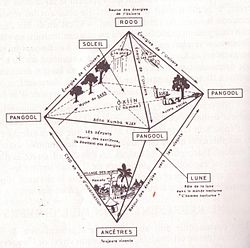Cosmogony
 Cosmogony, also spelled as cosmogeny,[1] or cosmogenesis[2] is any model concerning the origin of the cosmos or the universe.[3][4] TypesWhile cosmogony generally refers to origin stories, the nature and subject of these stories varies with times and sources. Ancient Greece developed a cosmogony focused on the origin of matter, space, and time with a transition from Chaos to Cosmos. This was a form of "philosophical cosmogony" that is distinct from modern empirical science but which nevertheless dealt with many similar questions.[5]: 7 Another type of cosmogony focuses on the formation and evolution of the Solar System.[4] or sometimes the formation of galaxies.[3] Modern the cosmological model of the early development of the universe is the Big Bang theory[6], but it is based on a model known to fail at the very earliest times.[7]: 275 Thus modern cosmogony is not generally a consequence of modern cosmology theories. Scientific theoriesSean M. Carroll, who specializes in theoretical cosmology and field theory, explains two competing explanations for the origins of the singularity, which is the center of a space in which a characteristic is limitless[8] (one example is the singularity of a black hole, where gravity is the characteristic that becomes limitless — infinite). When the universe started to expand, the Big Bang occurred, which evidently began the universe[citation needed]. The other explanation, held by proponents such as Stephen Hawking, asserts that time did not exist when it emerged along with the universe. This assertion implies that the universe does not have a beginning, as time did not exist "prior" to the universe. Hence, it is unclear whether properties such as space or time emerged with the singularity and the known universe.[8][9][clarification needed] Mythology  In mythology, creation or cosmogonic myths are narratives describing the beginning of the universe or cosmos. Some methods of the creation of the universe in mythology include:
Creation myths may be etiological, attempting to provide explanations for the origin of the universe. For instance, Eridu Genesis, the oldest known creation myth, contains an account of the creation of the world in which the universe was created out of a primeval sea (Abzu).[11][12] Creation myths vary, but they may share similar deities or symbols. For instance, the ruler of the gods in Greek mythology, Zeus, is similar to the ruler of the gods in Roman mythology, Jupiter.[13] Another example is the ruler of the gods in Tagalog mythology, Bathala, who is similar to various rulers of certain pantheons within Philippine mythology such as the Bisaya's Kaptan.[14][15]  Compared with cosmologyIn the humanities, the distinction between cosmogony and cosmology is blurred. For example, in theology, the cosmological argument for the existence of God (pre-cosmic cosmogonic bearer of personhood) is an appeal to ideas concerning the origin of the universe and is thus cosmogonical.[16] Some religious cosmogonies have an impersonal first cause (for example Taoism).[17] However, in astronomy, cosmogony can be distinguished from cosmology, which studies the universe and its existence, but does not necessarily inquire into its origins. There is therefore a scientific distinction between cosmological and cosmogonical ideas. Physical cosmology is the science that attempts to explain all observations relevant to the development and characteristics of the universe on its largest scale. Some questions regarding the behaviour of the universe have been described by some physicists and cosmologists as being extra-scientific or metaphysical. Attempted solutions to such questions may include the extrapolation of scientific theories to untested regimes (such as the Planck epoch), or the inclusion of philosophical or religious ideas.[9][16][6] See also
References
External links
|













